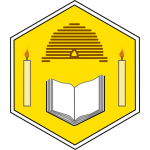The Central Association of Bee-Keepers (CABK)
Registered charity No. 278710
The CABK is an educational charity, registered in the UK, whose objective is to promote and further the craft of beekeeping.
This is achieved by organising lectures and producing publications to enable beekeepers, bee scientists and others interested in bees to keep in touch with the latest research and ideas about bees and other social insects, as well as related topics such as pollination.
We aim to act as a bridge between the beekeeper and the scientist.
The Central Association of Bee-Keepers (CABK) is a unique organisation. It invites as its speakers those who are acknowledged experts in their fields, both nationally and internationally, and also a selection of early-career researchers who are active in the field. In normal times, there are more than ten lectures given each year. A Spring Meeting is held in March, a Social Evening is held during the National Honey Show, and an Autumn Conference is held in the Midlands in November. During the Covid-19 pandemic we are continuing to “bring science to the beekeeper” by hosting a series of free webinars and Zoom Meetings, capitalising on the opportunity to access researchers from around the globe.

A selection of lectures given to the association are published and distributed free to members. These lecture booklets, of which approximately 240 have now been produced, are offered for sale to other beekeepers and additional copies may be purchased by members at a reduced rate. They are considered essential reading for those taking the British Beekeepers Association examinations or the National Diploma in Beekeeping, and are available by post or from our stands at the BBKA Spring Convention (April) and the National Honey Show (October).
History
The Central Association of Bee-Keepers dates in its present form from 1945, but can trace its origins back to the foundation of the British Beekeepers Association in 1874, which followed suggestions for the formation of a “central” or “national” beekeeping association in the previous year.
At the first meeting Sir John Lubbock, (later Lord Avebury, author of Ants, bees and wasps: a record of observations on the habits of the social Hymenoptera) was elected President, and among other well known names of those present were T.W. Cowan, Rev W.C. Cotton, W.B. Carr, W. Abbott and F. Cheshire. The BBKA originally consisted only of individual members, and one of its functions from the outset was to organise lectures by prominent beekeepers and scientists, which were then published and distributed to members.
The first lecture, in 1879, was given by F.R. Cheshire, on “The cause of abdominal distension in the hive bee in winter”. In time, many local beekeeping associations were formed, became affiliated to the BBKA and sent delegates to general meetings. In 1945, the BBKA was reorganised into its present form as an umbrella organisation for its (mainly English) affiliated beekeeping associations. The remaining individual members then formed themselves into a Specialist Member Association of the BBKA called “The Central Association of the British Beekeepers Association”, later shortened to its present name. The Patron of the CABK has for many years been the Master of the Worshipful Company of Wax Chandlers.
The objects of the CABK are to “promote and further the craft of beekeeping”. At first lectures were held in London and at various other locations, but perhaps influenced by the successful XIVth International Apicultural Congress held at Royal Leamington Spa in 1951, the programme had settled down to a Spring Meeting in central London, an evening lecture during the National Honey Show and an autumn weekend residential conference in the Midlands. More recently, the Spring Meeting has left its London venue, in 2020 being held in Arkendale, Yorkshire.
Publications
Over the last six decades, most of the prominent beekeepers and bee scientists working in Britain have lectured, often several times, to the Association. Approximately 240 published versions of CABK lectures in booklet form have now been produced, and three collected volumes of lectures, “Honeybee Biology” (1982), “Keeping Bees” (1993), both edited by Prof. John Free, and “Aspects of Sociality in Insects”, edited by Norman Carreck and Tony Johnson have also been published.
